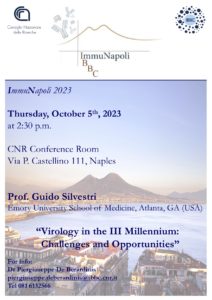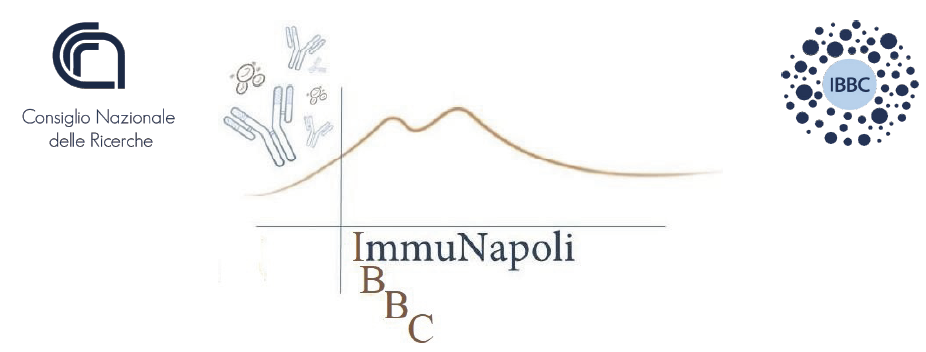 This year’s event will host Prof. Guido Silvestri from the Emory University school of Medicine, Atlanta, GA (USA).
This year’s event will host Prof. Guido Silvestri from the Emory University school of Medicine, Atlanta, GA (USA).
The title of the Lectio magistralis held by Prof. Silvestri will be:
“Virology in the III Millennium: Challenges and Opportunities”
For info:
Dr Piergiuseppe De Berardinis
piergiuseppe.deberardinis@ibbc.cnr.it
Tel. 081 6132566
Abstract
The emergence of SARS-CoV-2 and the COVID-19 pandemic has brought virology to the forefront of the scientific discourse, and to levels that were not seen since the beginning of the HIV/AIDS pandemic in the early 1980s. There are no doubts that the research-based response to COVID-19 has been nothing short of outstanding. Safe and effective vaccines were developed in ~10 months from the first publication of the virus genetic sequence, and a wide array of effective antiviral drugs, monoclonal antibodies, and immuno-modulatory agents have made a major impact of the clinical management of the disease. At the basic research level, a rapid and massive scientific effort has resulted, in a very short period of time, in an extraordinarily thorough characterization of the key genetic, biologic, and molecular features of SARS-CoV-2 and of its pathogenic interaction with the host, while virological surveillance studies conducted worldwide at a large scale have allowed a constant monitoring of the evolution of SARS-CoV-2 and its variants. However, the COVID-19 pandemic has also resulted in major challenges for virologists, including: (i) the involvement in communication efforts and media-based discussions, (ii) the need to navigate the pervasive interference of political agendas, and (iii) the well-known dangers of denialism, anti-vax movements, and other conspiracy theories. Finally, a more subtle but equally dangerous form of ideology has emerged, according to which the concept of efficacy and safety of the non-pharmacological interventions to contain the virus (i.e., lockdowns, curfews, and school closures) have been elevated to represent the official voice of science when, in fact, these NPIs should be seen as desperate emergency measures in the early stages of COVID-19 whose efficacy and safety in the post-vaccine phase of the pandemic remains highly controversial.
Biography
Dr. Guido Silvestri is currently a Georgia Research Alliance Eminent Scholar in Comparative Pathology (since 2010), as well as Professor and Chair in the Department of Pathology and Laboratory Medicine at the Emory University School of Medicine (since 2018). In addition, Dr. serves since 2022 as Executive Associate Dean for Research Strategy for the Emory University School of Medicine.
Dr. Silvestri received his M.D. from the University of Ancona (Italy) in 1987, and after finishing his service in the Italian Navy (1989) he completed his training in Internal Medicine/ Allergology & Clinical Immunology in 1993. Soon after that, he moved to North America and became involved in basic and translational research studies of AIDS pathogenesis, prevention, and therapy, mostly using non-human primate models of HIV infection. In 2001, Dr. Silvestri received a Board Certification in Clinical Pathology upon completion of a residency at the Hospital of the University of Pennsylvania.Since 2001 Dr. Silvestri has directed an independent NIH-funded research program. He is currently the principal investigator or a co-investigator of sixteen NIH grants, including a prestigious R37 MERIT award, and he is involved in both the Consortium for Innovative AIDS Research (CIAR) in non-human primates, the Center for HIV/AIDS Vaccine Immunology (CHAVI), and the Collaboratory of AIDS Researchers for Eradication (CARE). He is currently co-director of the Emory-based Enterprise for Research and Advocacy to Stop and Eradicate HIV (ERASE HIV), which was recently awarded a 5-year $25M grant from the NIH.Dr. Silvestri has authored or co-authored 292 peer-reviewed publications, including numerous in the highest impact journals (Nature, Cell, Science, Nature Medicine, etc). He has given invited lectures and seminars at >120 different institutions of 28 different countries. His work has been quoted >31,000 times (H-index 87), and has been presented in plenary sessions at all major virology and immunology conferences worldwide. Dr. Silvestri is an Associate Editor of PLoS Pathogens, and past-Editor of the Journal of Virology (2013-2023) and the Journal of Immunology (2006-2015).Dr. Silvestri served as Chairman or Standing Member in >50 study sections and advisory committees at the National Institutes of Health, the Canadian Institute for Health Research, the American Foundation for AIDS Research, the Australian Medical Research Council, the European Commission, and various other institutions. Among his current and past appointments, Dr. Silvestri is President of the Scientific Advisory Board of the Spallanzani-INMI (Rome, Italy), Co-Chair of the Scientific Council of the Agence Nationale pour la Recherche sur le SIDA, member of the Scientific Committee of the Conference on Retrovirus and Opportunistic Infections (CROI), , and Co-Chaired the 9th International AIDS Conference in Paris, July 2017. In 2022 he received the prestigious Dr. Martin Luther King Jr. Community Service Award of Emory University, the Alberty Levy Award for Scientific Excellence, and the Fiuggi Storia-Scienze award of the Levi-Pelloni Foundation and the Library of Shoah.

